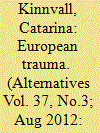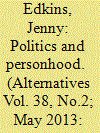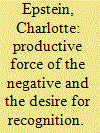|
|
|
Sort Order |
|
|
|
Items / Page
|
|
|
|
|
|
|
| Srl | Item |
| 1 |
ID:
114571


|
|
|
|
|
| Publication |
2012.
|
| Summary/Abstract |
This article examines the unfolding of traumas as structural and sociopsychological narratives focused on the bordering of identity and the governing of past present and future. Proceeding from a Lacanian conception of trauma and a Foucauldian understanding of governmentality, the analysis is centered on hegemonic counternarratives, even crises, involving the bordering of both Islam/Muslim identity and Europe/national identity. This "European trauma," or psychological moment, is exemplified through events in London 2005 and Norway 2011. It is perceived in terms of Chosen Traumas and Chosen Glories, the mythologization of past events that are retold, reinvented, and awarded new meanings in the present. Such traumas and glories can create a foundation for governing practices in which hegemonic interpretations of identity turn into normalizing narratives that justify violence. However, the governing of narratives is a contested process and alternative narrative understandings in terms of everyday practices can stimulate social resistance and psychological resilience, eventually challenging the normalizing bordering processes encountered in Europe today.
|
|
|
|
|
|
|
|
|
|
|
|
|
|
|
|
| 2 |
ID:
121199


|
|
|
|
|
| Publication |
2013.
|
| Summary/Abstract |
The faces of the missing are held aloft on placards in demonstrations or posted on walls in the aftermath of disappearances. They appear massed on the pages of newspapers and in the displays of genocide museums. Often nothing more than family snapshots given a public place, such images can be compelling. Although photographs of atrocity and war have frequently been discussed, little attention has been paid to these other images: images that do not show suffering but still seem, at least potentially, to be politically effective. How do these photographs work? What form of personhood do they instantiate and what politics do they point to? How are they different from other photographs? This article examines what might be special about a photograph, especially a photograph of a face, and how its political impact might be understood. Drawing on Lacanian psychoanalytic concepts of trauma and subjectivity, the article suggests that a photograph embodies in its very temporal structure a personhood that is inimical to contemporary structures of sovereign power. The destabilizing political potential of a photograph, like that of certain forms of literary text, could be understood as arising from its potential as an encounter with the trauma that inhabits sovereign power and sovereign subjectivity but that is generally concealed. The account presented offers an alternative approach to the analysis of the politics of a photograph and gestures toward other manifestations of personhood and politics.
|
|
|
|
|
|
|
|
|
|
|
|
|
|
|
|
| 3 |
ID:
162489


|
|
|
|
|
| Summary/Abstract |
In this article I theorise the concept of misrecognition that we aim to bring to the study of international politics with this Special Issue. I draw upon three sources to do so: recognition theory, Hegel, and Jacques Lacan. I show that, while the seeds of an interest in misrecognition were laid in that interdisciplinary Hegelian scholarship known as recognition theory, it remains underdeveloped. To develop it into a concept I chart a path through recognition theory back to Hegel’s original dialectic of the master and servant in the Phenomenology of Spirit. What the dialectic captures, I argue, are the actual dynamics of misrecognition in social life, not an idealised form of recognition. This foundational, constitutive misrecognition is what Lacan also theorises by way of his concept of ‘fantasy’. Both Hegel and Lacan foreground a misrecognised, desiring subject that challenges the ways in which agency has been understood in international politics. Lastly, I show the purchase of a Hegelian-Lacanian analysis for IR by considering the relations between sovereignty and nuclear weapons under the lens of fantasy.
|
|
|
|
|
|
|
|
|
|
|
|
|
|
|
|
|
|
|
|
|